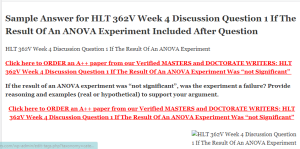HLT 362V Week 4 Discussion Question 1 If The Result Of An ANOVA Experiment
Sample Answer for HLT 362V Week 4 Discussion Question 1 If The Result Of An ANOVA Experiment Included After Question
HLT 362V Week 4 Discussion Question 1 If The Result Of An ANOVA Experiment
If the result of an ANOVA experiment was “not significant”, was the experiment a failure? Provide reasoning and examples (real or hypothetical) to support your argument.
Grading Rubric Guidelines
| Performance Category | 10 | 9 | 8 | 4 | 0 |
| Scholarliness
Demonstrates achievement of scholarly inquiry for professional and academic decisions. |
|
|
|
|
|
| Performance Category | 10 | 9 | 8 | 4 | 0 |
| Application of Course Knowledge –
Demonstrate the ability to analyze, synthesize, and/or apply principles and concepts learned in the course lesson and outside readings and relate them to real-life professional situations |
|
|
|
|
|
| Performance Category | 5 | 4 | 3 | 2 | 0 |
| Interactive Dialogue
Replies to each graded thread topic posted by the course instructor, by Wednesday, 11:59 p.m. MT, of each week, and posts a minimum of two times in each graded thread, on separate days. (5 points possible per graded thread) |
|
Summarizes what was learned from the lesson, readings, and other student posts for the week. |
|
|
|
| Minus 1 Point | Minus 2 Point | Minus 3 Point | Minus 4 Point | Minus 5 Point | |
| Grammar, Syntax, APA
Note: if there are only a few errors in these criteria, please note this for the student in as an area for improvement. If the student does not make the needed corrections in upcoming weeks, then points should be deducted. Points deducted for improper grammar, syntax and APA style of writing. The source of information is the APA Manual 6th Edition |
|
|
|
|
|
| 0 points lost | -5 points lost | ||||
| Total Participation Requirements
per discussion thread |
The student answers the threaded discussion question or topic on one day and posts a second response on another day. | The student does not meet the minimum requirement of two postings on two different days | |||
| Early Participation Requirement
per discussion thread |
The student must provide a substantive answer to the graded discussion question(s) or topic(s), posted by the course instructor (not a response to a peer), by Wednesday, 11:59 p.m. MT of each week. | The student does not meet the requirement of a substantive response to the stated question or topic by Wednesday at 11:59 pm MT. |
Also Read: HLT 362V Week 4 Assignment Workbook Exercise 18, 33 and 36
A Sample Answer For the Assignment: HLT 362V Week 4 Discussion Question 1 If The Result Of An ANOVA Experiment
Title: HLT 362V Week 4 Discussion Question 1 If The Result Of An ANOVA Experiment
TOPIC 4 DQ 1: Experimental, Quasi-Experimental,
and Non-Experimental Research
GCU Library consists of different research papers, both qualitative and quantitative, which have been published for the purposes of studies. These research studies can be categorized as quasi-experimental, experimental, and non-experimental in nature. The research study, titled, “Effect of Self Care Education Based on Orem’s Nursing Theory on Quality of Life and Self-Efficacy in Patients with Hypertension” is one of the main examples of a quasi-experimental study. From the above research study, the researchers were trying to analyze the effects of self-care education on the treatment processes and the quality of the healthcare outcomes among the patients. The research study is based on the Orem’s theory. From the research process, there was the manipulation of both the dependent and independent variables i.e. the experimental variables without the indiscriminate engagement of the study participants in the investigational conditions (Flannelly et al., 2018). Quasi-experimental designs are often applied in scenarios where randomization is difficult or impossible (Borusyak et al., 2018). One of the main example of the

quasi-experimental research design is the time-series analysis.
From the GCU library, an example of the experimental research is the one that was conducted by Claessen, Calder, Ebbels, and Leitaoa. There was the application of the single case methodology to evaluate or measure the efficiency of the shared or collective metalinguistic training and the grammar facilitation to advance regular past tense marking for the learners in the age between five and six and with language disorder. Number of respondents in the study was nine. In other words, the study has a sample size of nine. The experimental research incorporated the collection and analysis of data through adherence to the follow-up studies that were held at least twice every one week (Orero, 2018). The observation of study participants was done for about 20-30 minutes for each of the sessions.
Finally, an example of the non-experimental study from the GCU library is: “Assessment of Quality Indicators in the Evaluation and Enrolment Process of the In-Patients in the Liver Transplant Program”. The whole process of the study involved the collection and analysis of data for a duration of two years or twenty-four months. Different approaches of data analysis such as hypothesis testing, were done to ensure effective statistical outcomes in the whole process of the research.
References
Borusyak, K., Hull, P., & Jaravel, X. (2018). Quasi-experimental shift-share research designs (No. w24997). National Bureau of Economic Research.
Flannelly, K. J., Flannelly, L. T., & Jankowski, K. R. (2018). Threats to the internal validity of experimental and quasi-experimental research in healthcare. Journal of health care chaplaincy, 24(3), 107-130.
Orero, P., Doherty, S., Kruger, J. L., Matamala, A., Pedersen, J., Perego, E., … & Szarkowska, A. (2018). Conducting experimental research in audiovisual translation (AVT): A position paper. JosTrans: The Journal of Specialised Translation, (30), 105-126.

